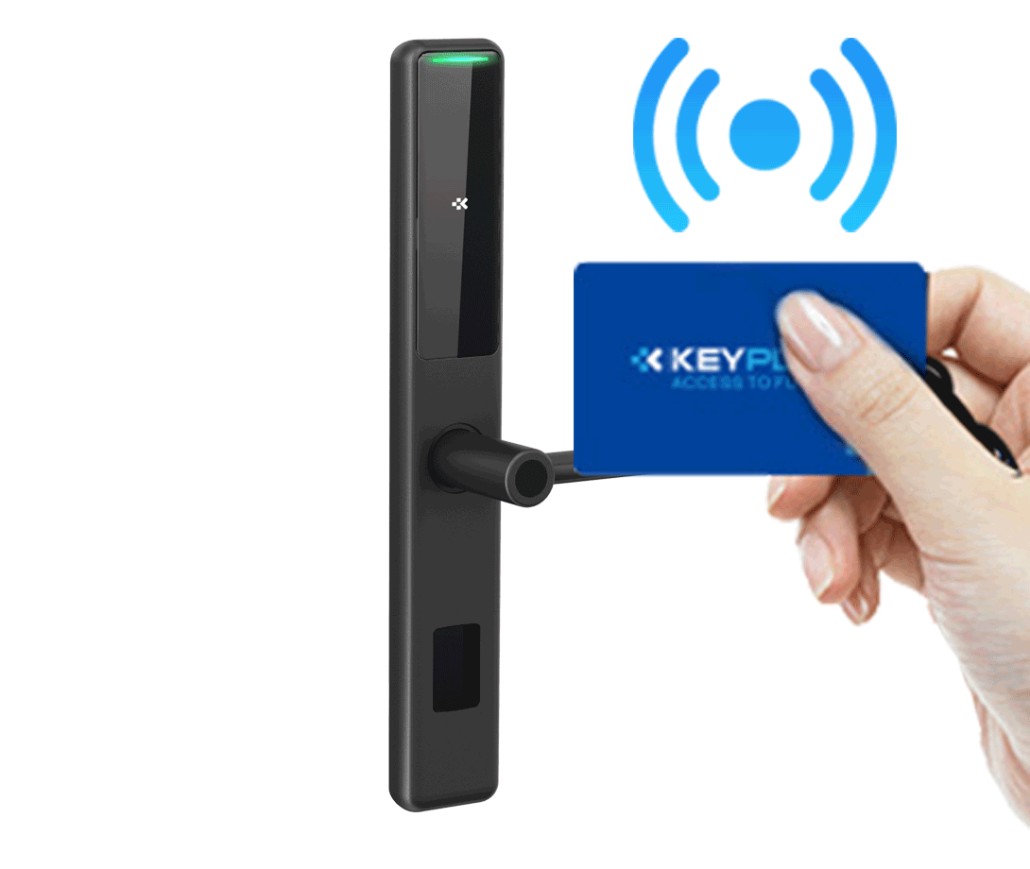NFC vs. RFID Door Locks: What’s the Difference?
When choosing a smart lock for your home or business, you’ll likely encounter two key technologies: NFC (Near Field Communication) and RFID (Radio-Frequency Identification). While both allow for keyless entry, they work differently and offer distinct advantages. This guide breaks down the differences between NFC and RFID door locks, helping you decide which is best for your needs.
1. How NFC and RFID Locks Work
RFID Locks use radio waves to communicate between a card/key fob and the lock. When you tap or hold an RFID card near the reader, the lock’s scanner detects the embedded chip and verifies access. RFID operates at various frequencies:
- Low-frequency (125 kHz) – Common in older hotel key cards.
- High-frequency (13.56 MHz) – Used in modern access control systems.
NFC Locks, a subset of RFID, also operate at 13.56 MHz but are designed for two-way communication. Unlike RFID, NFC allows devices (like smartphones) to act as both a reader and a tag. Many smartphones now support NFC, enabling you to unlock doors with just a tap.
Key Takeaway:
- RFID = One-way communication (card to lock).
- NFC = Two-way communication (phone can read and send data).
2. Security Comparison: Which Is Safer?
RFID Security:
Pro: Harder to clone than traditional keys.
Con: Basic RFID cards can be copied using cheap scanners.
Risk: ”RFID skimming” attacks can steal card data from a distance.
NFC Security:
Pro: Uses dynamic encryption, changing codes with each use (like Apple Pay).
Pro: Smartphone-based NFC keys require biometric authentication (fingerprint/face ID).
Con: Still vulnerable if a phone is lost/stolen (but can be remotely disabled).
Best for Security:
- NFC is more secure due to encryption and smartphone safeguards.
- High-frequency RFID is better than low-frequency for businesses.
3. Convenience & Practical Use Cases
RFID Locks Are Best For:
- Hotels & offices (easy to issue disposable key cards).
- Gated communities (long-range RFID fobs for parking gates).
- Budget-friendly solutions (RFID cards are cheaper than NFC setups).
NFC Locks Are Best For:
- Smartphone users (tap-to-unlock with a phone or smartwatch).
- High-security homes/businesses (dynamic codes prevent cloning).
- Smart home integration (works with Google Wallet, Apple HomeKey).
Battery Life Note:
- RFID cards don’t need power (passive technology).
- NFC phones drain battery slightly when used frequently.
4. Which Should You Choose?
Pick RFID If You Need:
Simple, low-cost access control.
Compatibility with existing keycard systems.
Long-range detection (for parking gates).
Pick NFC If You Prefer:
Smartphone-based entry (no physical cards).
Stronger encryption for security.
Future-proof smart home compatibility.
Hybrid Option:
Some advanced locks support both RFID and NFC, offering flexibility.
Final Verdict:
- For businesses/hotels → RFID (easy card management).
- For modern homes → NFC (best security & convenience).
Would you choose an NFC or RFID lock? Share your thoughts below!
Post time: May-05-2025


